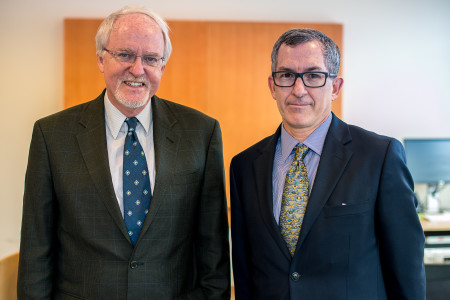
Emma Friedlander, Arts Editor
friedlan@grinnell.edu
Although 5,000 miles separate Grinnell from Moscow, Grinnell students had the chance to sit just a few feet from two Russian diplomatic officials as they visited campus this past week. Last Wednesday, Feb. 25, two Foreign Service Officers with specialties in U.S.-Russian relations visited the college to talk with students about Russia’s political history and future. The roundtable, called “Russia and the West: Conflict, Diplomacy and the Future,” was held in Faulconer Gallery. Faulconer is currently housing the photo exhibition “Siberia” and provided a timely backdrop to Thursday’s discussion.
John Beyrle, U.S. Ambassador to Russia from 2008 to 2012, joined Grinnell alumnus Eric Green ’85, the current Foreign Service Officer on the Russian desk of the U.S. Department of State. The roundtable conversation was preceded by a lunch in JRC 209, where Beyrle and Green chatted with students about careers in the Foreign Service, their experiences abroad and what Hillary Clinton and Sergei Lavrov are really like in person.
Beyrle and Green focused many of their comments during the lunch on how liberal arts educations are conducive to careers in the State Department.
“As a Foreign Service Officer, you are a generalist. Every two years you move to a new place and serve as an officer for the US in that area. That’s the essence of what liberal arts education is,” Green said, speaking of the benefit of his own education at Grinnell, where he majored in Political Science and Russian and worked as features editor for the S&B.
In addition to the qualifications for a good Foreign Service Officer, students were also interested to know about challenges in representing the United States abroad. Besides the obvious difficulties of relocating every two years, Beyrle emphasized the necessity of overcoming personal feelings when serving as a diplomat.
“There are times when you don’t agree with the policy decisions that are made in Washington, yet it’s your job to defend them,” Beyrle said. “You’re a little bit like a lawyer in this job. Your responsibility is to give your client, which is the American people, the best defense you can.”
Later, at the roundtable in Faulconer Gallery, Beyrle and Green’s conversation with students turned to questions specific to U.S.–Russian relations. Both Beyrle and Green prefaced the discussion by emphasizing the importance of history. As Beyrle explained, throughout the majority of the two countries’ histories they have served as allies to one another, an understanding that was muddled by the Cold War. Overcoming that misunderstanding is critical to ensuring global progress.
“It’s in our interest to continue to cooperate with Russia,” Green said, citing examples such as the Iran nuclear deal, Syria and climate change. “We want to make sure our policy leaves the door open to the possibility of Russia reintegrating with Western institutions.”
Of course, this U.S.–Russia cooperation is potentially hampered by current tensions between Russia and the West. As Ambassador to Russia during the reset of Russian foreign relations from 2008 to 2012, Beyrle could speak to the betterment of relations during that period and the subsequent decline in recent years.
“The problem with resets or periods of peaceful coexistences is not that they don’t produce results, it’s that they never last,” Beyrle said. “The approximate cause of the failure of the ‘reset’ to sustain itself can be traced, I think, to the return to the Kremlin by Vladimir Putin.”
Beyrle and Green also addressed the occupation of Eastern Ukraine from the standpoint of American policy.
“Whether we have a month’s notice or a week’s notice or a few days’ notice, the fundamental problem is that Putin was willing to commit armed force in a fairly overwhelming fashion in a very rapid way,” Green said. “The options that were left to the United States at that stage were quite limited. Instead, you have to rewind and look at the Ukraine crisis as it unfolded and think about things that could have been done differently in the weeks before.”
All of their answers pointed to the unpredictability and necessary tact when working in the Foreign Service. As Beyrle said, “Diplomacy is an art, not a science.”
The two events were highly attended by students in Russian and Political Science, especially those with interest in the Foreign Service. One student, Kieran Connolly ’17, felt he especially benefited from the talk because of his personal interest in working in Eastern European relations.
“It was great to hear the insights of diplomats with weighty Russia experience,” Connolly wrote in an email to the S&B. “I got to ask Beyrle his thoughts about Obama’s attempt to achieve a diplomatic ‘reset with Russia,’ which was perhaps Beyrle’s main mission in his ambassadorship. Overall, it was a fantastic experience to meet and listen to people who’ve reached the highest positions in a career that I’m interested in.”






















































